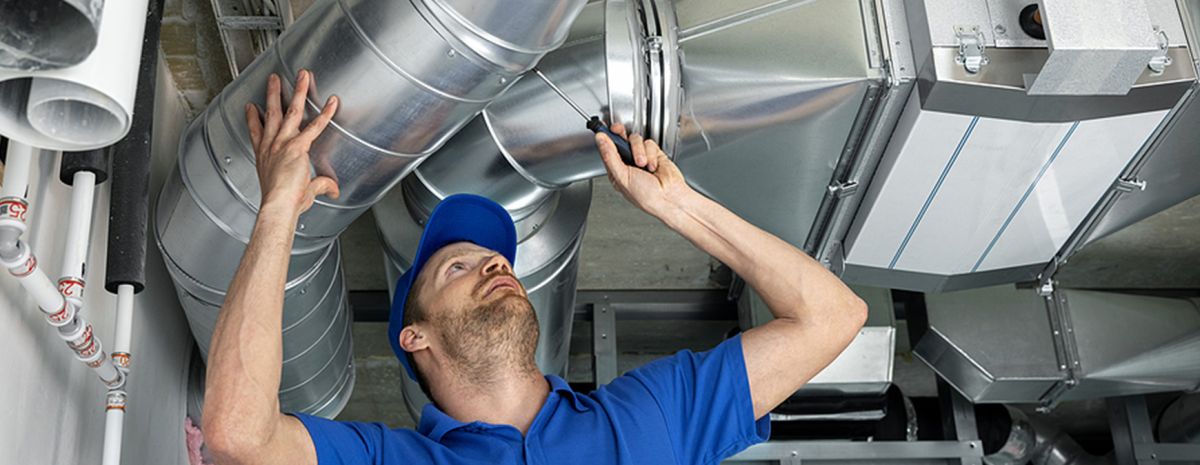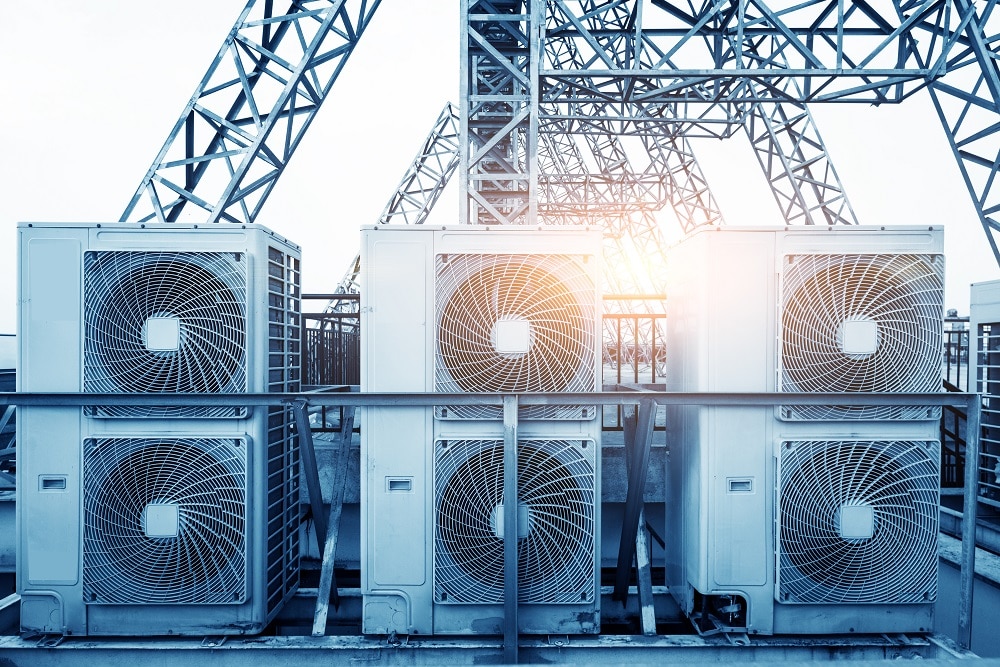Exploring the Vital Elements of an Effective Heating And Cooling System
A reliable a/c system is improved several essential parts that operate in consistency. Each component, from the thermostat to the ductwork, plays a vital function in maintaining convenience and energy efficiency. Comprehending these components is important for optimizing efficiency and boosting indoor air top quality. As one examines these components, the detailed connections in between them disclose understandings into improving overall system efficiency. What details factors contribute most to this efficiency?
The Role of the Thermostat in Heating And Cooling Efficiency
Although frequently ignored, the thermostat plays a vital function in the performance of cooling and heating systems. HVAC experts. This little gadget works as the main nerve center, controling temperature setups and making sure excellent comfort within a room. By precisely noticing the ambient temperature, the thermostat interacts with the home heating, air, and ventilation conditioning systems to maintain the desired climate
A reliable thermostat reduces energy usage by activating the HVAC system just when needed, therefore preventing too much heating or cooling. Modern programmable and clever thermostats boost this efficiency better by enabling customers to establish routines and from another location readjust setups, adjusting to everyday routines.
The placement of the thermostat is crucial; inappropriate area can lead to unreliable temperature level analyses, resulting in ineffective procedure. On the whole, a well-functioning thermostat not only boosts convenience but also contributes markedly to energy cost savings and the long life of the heating and cooling system.
Recognizing the Importance of Air Filters
Air filters offer an essential feature in cooling and heating systems by guaranteeing that the air distributing within an area continues to be clean and healthy. These filters trap dust, irritants, and various other toxins, preventing them from being recirculated throughout the setting. By capturing these fragments, air filters add to enhanced interior air high quality, which can substantially profit passengers' health and wellness, especially those with allergies or respiratory conditions.
Additionally, preserving clean air filters enhances the effectiveness of HVAC systems. Clogged filters can restrict airflow, triggering the system to function tougher to keep desired temperatures, bring about enhanced power usage and higher energy bills. Regularly replacing or cleaning filters is a crucial maintenance step that can lengthen the lifespan of cooling and heating tools. Eventually, recognizing the importance of air filters permits home owners and building supervisors to take aggressive actions to guarantee a well-functioning, efficient HVAC system that promotes a comfy and risk-free interior setting.

The Performance of the Heating System and Heatpump
Furnaces and heatpump are important elements of cooling and heating systems, responsible for giving warmth during chillier months. Heaters operate by heating air with combustion or electric resistance, then distributing it throughout the home through ducts. They typically use rapid home heating and can be fueled by gas, electrical energy, or oil, depending on the system type.
On the other hand, heatpump transfer heat instead than produce it. They draw out heat from the outside air or ground, even in reduced temperature levels, and move it indoors. HVAC experts. This twin performance permits warm pumps to likewise provide air conditioning in warmer months, making them versatile alternatives for year-round climate control
Both systems call for proper upkeep to guarantee efficiency and longevity. While furnaces excel in extreme cool, warm pumps can be useful in modest environments. Recognizing their distinct functionalities help homeowners in selecting one of the most ideal option for their home heating requires.
Discovering the Cooling Unit
The air conditioning unit is a crucial component of cooling and heating systems, readily available in different kinds to fit different demands. Understanding the efficiency scores of these devices is vital for making informed options about power consumption and price. This section will certainly explore the varied sorts of air conditioning system and clear up exactly how effectiveness rankings impact performance.
Sorts Of Air Conditioners
While various variables influence the option of a/c systems, understanding the various kinds available is vital for property owners and building managers alike. Central air conditioners are created to cool down entire homes or buildings, using a network of air ducts for airflow. Home window systems use a more localized solution, perfect for tiny rooms or single areas. Portable ac unit give find adaptability, allowing customers to relocate the system as required. Ductless mini-split systems are another choice, incorporating the effectiveness of main systems with the convenience of zoning, as they need no ductwork. Lastly, geothermal systems harness the earth's temperature level for energy-efficient cooling. Each kind comes with unique advantages, making informed selections important for efficient environment control.

Effectiveness Scores Explained
Understanding performance scores is crucial for picking the ideal a/c device, as these metrics offer insight right into the system's performance and energy usage. The most usual rating for ac unit is the Seasonal Power Effectiveness Ratio (SEER), which determines the cooling output throughout a typical cooling season separated by the total electrical power input. A greater SEER shows much better effectiveness. Additionally, the Power Performance Ratio (EER) is utilized for gauging efficiency under certain conditions. One more essential metric is the Power Star certification, which signifies that an unit meets strict power effectiveness guidelines. By reviewing these ratings, consumers can make educated options that not just maximize comfort but also decrease power prices and environmental influence.
The Relevance of Ductwork and Airflow
Effective ductwork design and airflow administration play crucial functions in the total effectiveness and efficiency of HVAC systems. Correct ductwork warranties that conditioned air is distributed evenly throughout a room, minimizing temperature level fluctuations and improving comfort. Properly designed air ducts decrease resistance to air movement, decreasing the work on HVAC devices and ultimately reducing energy usage.
Air movement monitoring includes tactically putting vents and registers to boost the flow of air. This prevents usual problems such as hot or chilly places, which can happen when airflow is blocked or inadequately well balanced. Additionally, the appropriate duct materials and insulation visit the website can additionally boost effectiveness by reducing warmth loss or gain throughout air transportation.
An effective ductwork system not just contributes to energy cost savings however can also prolong the life expectancy of cooling and heating equipment by reducing unnecessary strain (HVAC experts). Understanding the relevance of ductwork and air movement is crucial for attaining peak HVAC system efficiency.
Regular Maintenance Practices to Enhance Performance
Regular upkeep techniques are important for making certain peak efficiency of cooling and heating systems. These practices consist of routine assessments, cleaning, and essential repair services to keep the system running efficiently. Regularly changing air filters is vital, as blocked filters can block air flow and reduce efficiency. On top of that, technicians ought to check and tidy evaporator and condenser coils to avoid getting too hot and energy waste.
Yearly specialist inspections are also advised, as experienced specialists can identify potential concerns prior to they rise. Lubricating relocating parts lessens damage, adding to a longer life expectancy for the system. Additionally, ensuring that the thermostat functions properly help in keeping ideal temperature control.

Frequently Asked Concerns
How Typically Should I Change My Thermostat?
Thermostats must usually be replaced every 5 to 10 years, depending on usage and innovation innovations. Normal checks are recommended to ensure peak performance, specifically if experiencing irregular temperature control or increased energy expenses.
What Dimension Air Filter Is Ideal for My A/c System?
The very best size air filter for an a/c system varies by system style. Usually, it's essential to seek advice from the proprietor's handbook or examine the existing filter measurements to ensure peak performance and air top quality.
Can I Install a Warm Pump Myself?
Mounting a heat pump separately is possible for experienced people, however it calls for expertise of electrical systems and regional codes. Hiring an expert is suggested to guarantee correct installation and ideal system efficiency.
Just how Do I Know if My Ductwork Is Reliable?
To identify ductwork effectiveness, one should look for leaks, measure air movement at vents, inspect insulation top quality, and assess temperature distinctions in between supply and return air ducts. Expert analyses can provide thorough understandings into overall efficiency.
What Are Signs My Heating And Cooling Demands Immediate Maintenance?
Indications that an a/c system needs prompt maintenance include unusual sounds, inconsistent temperature levels, boosted power bills, undesirable odors, and constant cycling. Addressing these problems promptly can avoid further damage and warranty height system efficiency.
Air filters offer a crucial feature in A/c systems by guaranteeing that the air flowing within an area stays healthy and balanced and tidy. Additionally, keeping tidy air filters improves the effectiveness of HVAC systems. Ductless mini-split systems are another option, integrating my response the efficiency of main systems with the benefit of zoning, as they need no ductwork. Recognizing performance ratings is necessary for choosing the best air conditioning device, as these metrics provide insight right into the system's efficiency and energy usage. The ideal size air filter for a HVAC system differs by unit layout.